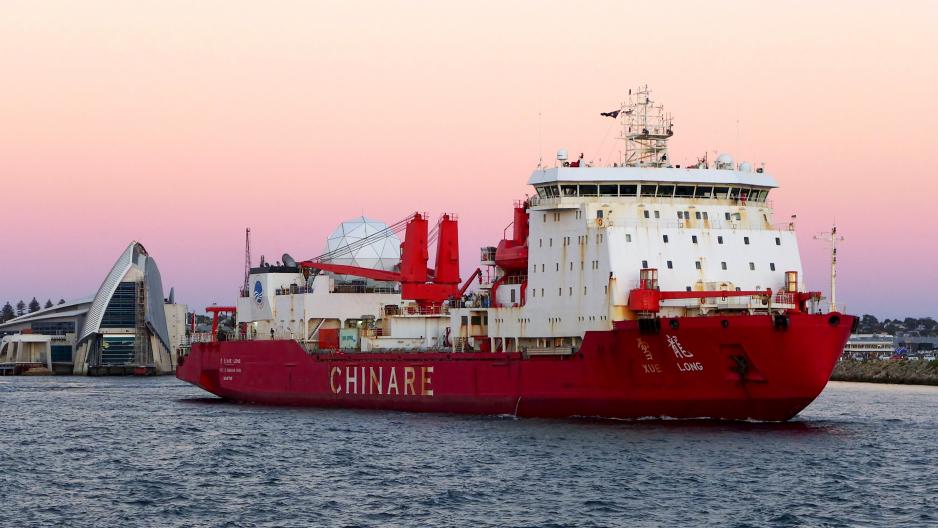Op-ed The Increasing Security Focus in China’s Arctic Policy

Chinese icebreaker Xue Long departing from the inner harbour of the Port of Fremantle, Western Australia, on her way back to her port of registry, Shanghai, China, after a visit to Antarctica. (Photo: Bahnfrend/Wikimedia Commons).
Op-ed: "A scientific presence in the Arctic not only provides China with legitimate access to the region’s waters, but also the technical capabilities to map, survey and monitor the region". By Heljar Havnes and Johan Martin Seland.
As China seeks to increase its influence in the Arctic region, the debate about Beijing's intentions has been going among stakeholders and observers. The perception of China in the Arctic diverges significantly among Arctic nations.
The concerns about China’s Arctic strategy is often related to its perception, alongside Russian militarization of the Arctic, as a dual threat to the established international order. On the other hand, Chinese investment and aspirations to develop commercial ties to the region has been welcomed by several Arctic nations.
Our research shows that the reality is a middle ground between how China describes its own Arctic strategy and the most critical Western analyses. There is currently little available evidence to suggest that China will pursue a military course in the Arctic. Commercial development appears to be China’s main goal, but it is evident that China is building its capacity to enforce its perceived rights and protect its interests through an increasingly security-focused Arctic strategy that is backed up by the military.
Building up capacity
Whereas accusations of Chinese militarisation of the Arctic is far from reality as of now, the country's Arctic policy stakeholders, some of them military, have taken to build up dual military-civilian capacities in the region since at least 2014.
According to our analysis of publicly available documents and working papers from key Chinese stakeholders, the political leadership in Beijing determined that developing the ability to access and exploit the Arctic was a diplomatic, economic, and security imperative two decades ago.
We have found that China has been steadily increasing its diplomatic and scientific efforts to support its commercial aspirations in the Arctic since 2006 and that Beijing has been building its capacity to defend these interests in the Arctic region through military means since at least 2014.
Arctic Council
China’s increasing focus on commercial opportunities in the Arctic has grown in tandem with its efforts to contribute to the shaping of norms and rules in the region through multilateral forums. Chinese science diplomacy has been a key factor in its ascendance to observing member of the Arctic Council and one of the most productive nations when it comes to publishing Arctic research.
Also read
The research activities in the Arctic are at the centre of the scepticism formulated by Arctic countries about Beijing's intentions in the region. A scientific presence in the Arctic not only provides China with legitimate access to the region’s waters, but also the technical capabilities to map, survey and monitor the region.
These research activities therefore have the potential to support both Chinese commercial and military activities in the Arctic. Our research finds that key Chinese stakeholders have built such dual capacities in the region since at least 2014.
Arctic a priority
One military scholar, for example, sums up the security priorities of China in the Arctic, stating that, “the military has made knowledge accumulation and institutional improvement for the Arctic governance” a priority.
There are two main focus areas identified in our research:
1) Navigation and satellite technology and 2) Strategic implications of a Chinese Arctic presence.
China’s focus on commercial opportunities in the Arctic has grown in tandem with efforts to shaping of norms and rules through multilateral forums.
Research conducted by the Chinese People's Liberation Army (PLA), both unilaterally and in cooperation with civilian stakeholders, indicates that Arctic navigation and satellite surveillance technology has been identified as a priority by China’s military establishment. Beyond the technical aspects of navigation and monitoring the Arctic, the strategic implications of a Chinese naval presence in the Arctic have also been the subject of PLA-affiliated research.
The identification of potential military threats to China’s interests in the Arctic indicates China’s increased awareness of the security implications of its Arctic presence, and the need to devote resources to address them. However, such a shift does not directly translate into China becoming an aggressive player in the Arctic.
Much of China’s naval capabilities remain tied to the South China Sea, and China does not claim sovereignty over any parts of the Arctic. Rather, the Chinese military will likely support Beijing’s trade and commercial ambitions in the region—which remains dependent on cooperation with other countries. Military prerogatives thus operate in a fine balancing act alongside commercial goals.
These assertions are shared by key military and intelligence officials in the Arctic, but are seldom discussed publicly by foreign policy decisionmakers outside the US. Public reports from the Danish intelligence service from 2019 echo our findings, and Swedish defence researchers have since at least 2018 pointed to the risk of Swedish commercial satellite cooperation with China being used for military purposes.
The US Department of Defense argues that “(c)ivilian research could support a strengthened Chinese military presence in the Arctic Ocean, which could include deploying submarines to the region as a deterrent against nuclear attacks”.
Maritime territories
Another crucial element of Beijing's strategic thinking on the Arctic, according to public documents and Chinese strategic thinkers, is the region's legal status and diverging legal interpretations of its waterways among Arctic countries. For example, Russia claims that the North-East Passage, the Arctic sea route eastward from the Atlantic to Asian shores, belongs to its waters, whereas Canada contends that the North-West Passage, the opposite route, is within its internal waters.
Both of these positions have been opposed by other Arctic Countries, the dispute between the US and Canada being the most prominent. Looking ahead, the Arctic presents China with important legal challenges. China’s legal stance on the Arctic, where it adheres to the majority-held interpretation of UNCLOS, contradicts its own stance in the South China Sea and East China Sea, where it maintains a minority-held interpretation of the same legal framework to claim maritime territories.
This contradiction could become a double-edged sword weakening China’s legal arguments in both the Arctic and in its regional waters. This apparent contradiction fuels the most critical Western analyses. These often refer to China's militarisation of the South China Sea and lacking compliance with UNCLOS as a sign that China may use military capabilities to secure its interests in the Arctic in a similar way if tensions and disputes arise.
Broader strategic implications
Our research shows that China’s Arctic strategy is focused on achieving two main goals:
Ensuring access to commercial opportunities in the Arctic and building capabilities to enforce its perceived rights and claims in the region.
It is evident that China has, since at least 2014, been building its capacity to defend its interests in the region through an increasingly security-focused Arctic policy that is supported by the military.
For Arctic policymakers and observers, China’s future actions in the region will provide valuable insight into how Beijing balances its role in international governance with its wider strategic interests, both within and beyond its immediate boundaries, as it increases its presence on the world stage.
The original research paper was first published by The Arctic Institute. The views expressed in this article are the author’s own.


